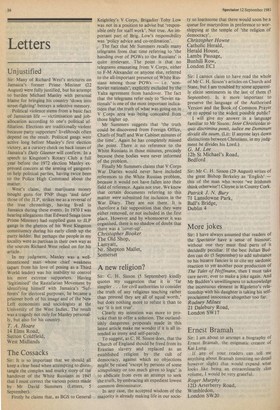A new religion?
Sir: C. H. Sisson (5 September) kindly quotes my suggestion that it is 'far simpler . . . for civil authorities to consider the truth of any religious teaching rather than pretend they are all of equal worth,' but does nothing more to refute it than to say 'it is not true'.
Clearly my intention was more to provoke than to offer a solution. The outlandishly dangerous proposals made in this latest article make me wonder if it is all intended as irony and self-parody.
To suggest, as C. H. Sisson does, that the Church of England should be freed from its Erastian slavery and replaced as an established religion by the cult of democracy, against which no objections might be raised 'except by persons of some scrupulosity or too much given to logic' is to abdicate from even an attempt to seek the truth, by embracing an expedient lowest common denominator.
In any case, the accepted wisdom of the majority is already making life in our socie ty so loathsome that there would soon be a queue for martyrdom in preference to worshipping at the temple of 'the religion of democracy'.
Christopher Howse
Catholic Herald, Herald House, Lambs Passage, Bunhill Row, London EC1 Sir: 1 cannot claim to have read the whole of Mr C. H. Sisson's articles on Church and State, but I am troubled by some apparently elitist sentiments in the last of them (5 September). Is it more important to preserve the language of the Authorised Version and the Book of Common Prayer or to appeal to the widest possible public?
I will give my answer in a language familiar to Mr Sisson: Inter Christicolas siquis discrimina ponit, iudice me Dominutn dividit ille suum. (Lit: If anyone lays down distinctions between Christians, in my judgment he divides his Lord.)
G. M. Lee
12b St Michael's Road, Bedford
Sir: Mr C. H. Sisson (29 August) writes of the great Bishop Berkeley as 'English' — this of the man who wrote 'we Irishmen think otherwise'! Cloyne is in County Cork.
Patrick J. N. Bury 71 Lansdowne Park, Ball's Bridge,
Dublin 4
































 Previous page
Previous page